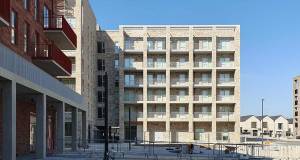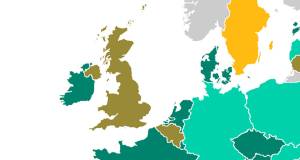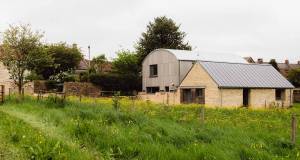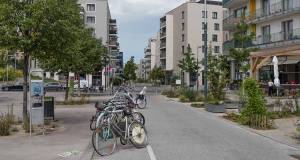- Planning
- Posted
Telling it Like it is

The recent media frenzy regarding planning reflects divided opinions across Ireland . The publication this year of the Draft Guidelines on Sustainable Rural Housing has been seen as symptomatic of a political preoccupation with short term popularity rather than long term infrastructural development.
Iain Douglas, President of the Irish Planning Institute reveals his views on the state of planning in Ireland, and the factors which could not only damage the environment in Ireland, but also cause social segregation, and aid unsustainable development across Ireland.
At the present time there is some considerable disillusionment with planning, its achievements and potential. The development of this attitude has run parallel to the progressive alienation of the public from a system of government which is apparently unable to cope with many of the most serious problems it faces. In the current debate it seems that only planning as a profession and planning practitioners are under intensive scrutiny – why is this?
What is planning all about?
In dealing with the future planners are trained to t hink in all dimensions, balancing local and regional strategies within global trends. They must strive to protect the integrity of the natural environment, promote the excellence of urban design and endeavour to conserve the heritage of the natural and built environment for future generations. They have to develop alternative potential solutions for specific problems and challenges, measuring carrying capacities and impacts, enhancing local identities, and contributing to their implementation programmes and feasibility studies. Planners must develop spatial visions showing opportunities for the future development of cities or regions, and in the case of the National Spatial Strategy, the nation. They must identify linkages and relationships of a spatial plan or scheme within the relevant international networks of cities and regions. They must also expand choice and opportunity for all, recognising a special responsibility for the needs of disadvantaged groups and persons.
The distinctive factor of spatial planning is that it focuses primarily on the interests of society as a whole, the settlement or the region as an entity, and the longer-term future. This immediately contradicts the standpoint of the developer - whose sole motivation is quick and easy profits; the politician - whose motivation is to get elected & stay there for the next four years and the public - whose view is confined to their own needs. One cannot question the validity of these view points but we need to reconcile them somehow.
The vision and the promotion of the “common good” is what sets planners apart from the other actors involved in the development process and for far too long the “common good” has been relegated or downright ignored in our planning system.
Just as the first attempt at long term national planning, the Buchanan Report in the 1970’s, was sacrificed on the altar of political expediency so too the latest attempt at long term, national planning – the National Spatial Strategy (NSS) – has become a devalued currency because the Government is clearly equivocating it’s commitment to the NSS. Two cases in point are the decentralisation of the civil service to numerous locations outside the “hubs” identified in the NSS, and the Draft Guidelines on Sustainable Rural Housing. Neither will help balanced regional development. By undermining the NSS the commitment of Government to long term strategic planning has to be questioned and with it the political will to redress regional imbalance in Ireland today.
Why, after 40 years of planning is the planning agenda still being driven by short-term perspectives and political expediency? Is our democracy not mature enough to take a long term view of society and the environment when we can somehow manage medium – long term planning for the economy? Why can’t we as a society and as individuals rise above base self interest? If long term national spatial planning works for other countries why not Ireland?
The Draft Guidelines on Sustainable Rural Housing are a case in point. It seems to me that these guidelines were railroaded through before the June election in reaction to pressure from a few highly vocal interest groups. This, in my opinion, is not the way for such an important issue to be handled and shows little regard for the facts of the matter.

The Department of Environment, Heritage and Local Government’s own investigation into the area of rural planning reported the following;
- An average of 75% of applications for single rural houses were granted
- The highest grant rates are in the westernmost planning authorities with grant rates falling somewhat in the more urbanised areas to the east.
- Most planning authorities in the western half of the country grant around 4 out of 5 applications.
- Where permission is refused, the reasons for refusal generally relate to land use issues such as traffic safety, public health or protection of the natural and cultural heritage including landscape.
It is acknowledged that these figures are at county level and may not pick up on particular areas of development pressure or areas where planning issues are more complex and where, correspondingly, the numbers of permissions granted may be lower.
It is worth noting that the lobby groups appear to have had free access to the Minister in the preparation of the guidelines while the same courtesy was not extended to the Irish Planners Institute (IPI) which is the Country’s largest organisation representing professional planners.
As a result of both pandering to lobby groups pursuing their own narrow agenda and by publishing these guidelines for a political “quick fix” sight has been lost of the bigger issue - that the rural housing dilemma is a symptom of a much larger problem related historically to the poor quality of much of our urban fabric and urban residential development, the lack of investment in infrastructure of our smaller towns and villages and the extraordinary cost of building land in serviced centres.
Has anyone examined the hypothesis that the possibility of 250,000 new single houses built in the countryside over the next 20 years and propounded by the guidelines could lead to social segregation with social housing concentrated in the towns and villages through the provisions of Pt V and the middle-classes in one-off housing in the countryside?
- The lack of an overall planning perspective at national level is exemplified by a programme of substantial investment in rural water & sewerage infrastructure through the CLAR Programme, yet this is being negated by the free for all of housing in the countryside serviced by septic tanks promoted by the guidelines.
No-one can dispute the fact that there are serious issues confronting the growth and development of rural Ireland but simply building houses will not solve those problems. The guidelines contribute little by way of meaningful examination of the problems of rural Ireland . In short they represent political expediency at its worst which does nothing to advance planning or politics in this country.
However planning is not solely concerned with plan preparation, it is also part of a political process aiming to balance all relevant interests - public and private – and resolving conflicting demands on space, place and the environment.
The local government system is based to a large degree on the cooperation and trust between elected members & the executive. It is obvious in some counties that trust has completely broken down and urgent measures have to be taken to restore a working relationship.
Planners too must also look to themselves and acknowledge that the other actors in the development process have roles to play and that there is the reality of everyday business to be conducted.
In dealing with the political aspect planners need to acknowledge:
- the principles of solidarity, subsidiarity and equity in decision-making,
- the need to clearly inform politicians, the public of proposals, objectives, targets, impacts, problems, and provide them with plans and solutions
- the need to facilitate meaningful public participation and involvement
- the need to work towards consensus or resolve conflict
- the need to communicate our point of view well
This points to the importance of the role of the planner as a mediator and communicator but also the need for greater resources to be put into planning if we are offer to the public, politicians and developers alike an efficient and reliable level of service.
The current imbalance within local government arises because the elected members have lost sight of or do not wish to acknowledge the “common good”, in seeking to advance the claims of a particular constituent. The controversy surrounds particular planning decisions that were refused, with no cognisance given to the vast majority of applications granted. In 2002 nationally only 15.9% of all planning applications were refused . E lected members need to accept that they have a wider obligation than simply pursing votes.
The distinct lack of civic responsibility demonstrated by the abuse of Section 140 motions in some county councils around the country brings no credit to the practice of politics and is in marked contrast to the good working relationships that exist between councillors and planners in the majority of other counties.
Planning in Ireland has become the complete antithesis of what it should be. Nothing seems to have changed in 40 years of planning and development in this country at all. It is an alarming situation.
Related items
-
 Peaky blinder
Peaky blinder -
 History repeating
History repeating -
 King of the castle
King of the castle -
 Energy poverty and electric heating
Energy poverty and electric heating -
 Build Homes Better updates Isoquick certification to tackle brick support challenge
Build Homes Better updates Isoquick certification to tackle brick support challenge -
 Flat earth
Flat earth -
 Material matters - A palette for a vulnerable planet
Material matters - A palette for a vulnerable planet -
 Derelict to dream home
Derelict to dream home -
 Final opportunity for construction professionals to secure 80 per cent training subsidies
Final opportunity for construction professionals to secure 80 per cent training subsidies -
 Big picture - Points of access to resilient living
Big picture - Points of access to resilient living -
 Storm breaker
Storm breaker -
 Enniscorthy to host ‘make or break’ sustainable building summit
Enniscorthy to host ‘make or break’ sustainable building summit

